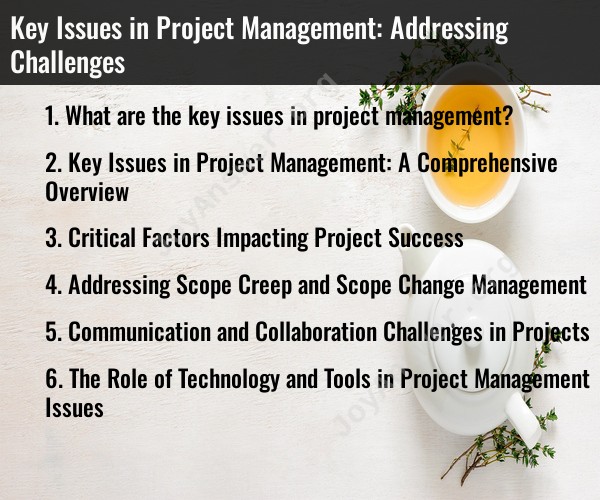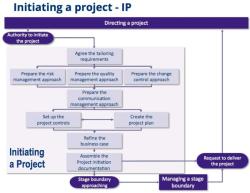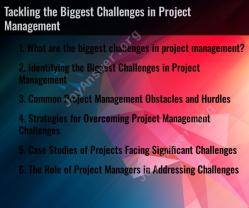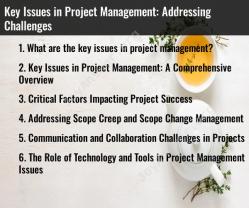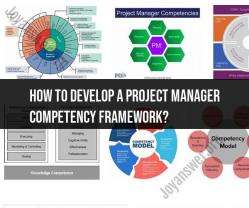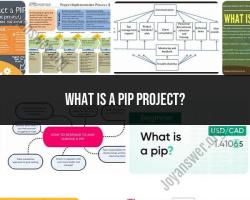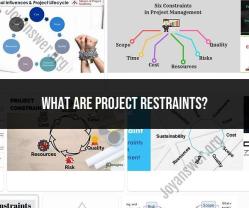What are the key issues in project management?
Project management involves coordinating and overseeing various aspects of a project to ensure it is completed successfully, on time, and within budget. While each project is unique, there are common challenges and key issues that project managers often encounter. Some of the key issues in project management include:
Scope Creep: Project scope changes that occur without proper documentation and approval can lead to scope creep. It can result in increased costs and delays.
Resource Management: Efficiently allocating and managing resources, including personnel, time, and budget, is a constant challenge. Overallocation or underutilization of resources can impact project success.
Risk Management: Identifying, assessing, and mitigating project risks is essential. Failure to manage risks can lead to unexpected issues that may disrupt the project.
Communication: Effective communication is crucial. Miscommunication can result in misunderstandings, delays, and errors. Project managers must ensure stakeholders are well-informed.
Quality Control: Maintaining and controlling the quality of project deliverables is a challenge. Ensuring that the project meets or exceeds stakeholder expectations is an ongoing task.
Timeline and Deadlines: Meeting project deadlines is often a top priority. Delays can occur due to a variety of factors, including resource constraints, scope changes, or external factors.
Stakeholder Management: Managing the expectations and needs of various project stakeholders, including clients, team members, and management, can be complex.
Change Management: Handling changes in project requirements, goals, or circumstances can be challenging. Adapting to changes while minimizing disruptions is key.
Budget Management: Staying within budget is essential. Overruns can strain resources and lead to financial issues.
Team Collaboration: Promoting effective teamwork, collaboration, and motivation among team members is critical to project success.
Procurement and Vendor Management: For projects involving external suppliers or vendors, procurement and vendor management require careful oversight to ensure delivery and quality.
Technological Challenges: Technology-related issues, such as software or hardware failures, can disrupt project progress.
Regulatory and Compliance Issues: Projects in regulated industries may face complex compliance requirements that must be adhered to.
Geographical and Cultural Differences: Managing projects across different geographical locations and dealing with cultural differences among team members can pose challenges.
Sustainability and Environmental Concerns: Sustainable and environmentally responsible practices are increasingly important in project management.
Ethical Dilemmas: Ethical considerations, such as integrity in reporting and decision-making, may arise in project management.
Human Resource Issues: Addressing conflicts, motivation, skill gaps, and turnover within the project team are HR challenges project managers must handle.
Lack of Clarity in Objectives: Projects with unclear goals and objectives can suffer from directionlessness and inefficiency.
Inadequate Data and Information Management: Managing project data, information, and documentation is crucial. Inadequate data management can lead to errors and confusion.
Lessons Learned and Continuous Improvement: Failing to capture and apply lessons learned from past projects can hinder the improvement of project management processes.
Successful project management involves addressing these key issues through effective planning, communication, risk assessment, and adaptability. Project managers must be well-prepared to handle these challenges to ensure the successful completion of their projects.
Key Issues in Project Management: A Comprehensive Overview
Project management is the process of planning, executing, monitoring, and closing a project. It is a complex and challenging process, and there are many key issues that project managers must face.
Some of the most common key issues in project management include:
- Scope creep: Scope creep is the uncontrolled growth of a project's scope. It occurs when new requirements are added to a project without adjusting the budget, schedule, or resources. Scope creep can be caused by a number of factors, such as changes in client requirements, poor communication, and unrealistic expectations.
- Scope change management: Scope change management is the process of managing changes to a project's scope. It is important to have a well-defined process in place for managing scope changes, as they can have a significant impact on the project's budget, schedule, and quality.
- Communication and collaboration challenges: Communication and collaboration are essential for project success. However, there are often challenges that can arise, such as language barriers, cultural differences, and conflicting priorities. Project managers must be able to communicate effectively with all stakeholders and foster a collaborative environment.
- Technology and tools: Technology and tools can be a great asset to project managers. However, they can also present challenges, such as integration issues, training requirements, and security concerns. Project managers must carefully select the right technology and tools for their project and ensure that they are used effectively.
Critical Factors Impacting Project Success
There are a number of critical factors that impact project success. Some of the most important factors include:
- Clear and achievable goals: Projects must have clear and achievable goals. The goals should be specific, measurable, achievable, relevant, and time-bound.
- Well-defined scope: The project scope should be clearly defined and agreed upon by all stakeholders. This will help to prevent scope creep and ensure that the project is focused on the right deliverables.
- Realistic budget and schedule: The project budget and schedule should be realistic and achievable. It is important to factor in a contingency plan for unexpected events.
- Qualified and experienced team: The project team should be qualified and experienced to deliver the project successfully. This includes having the necessary skills, knowledge, and experience.
- Effective risk management: Risks should be identified and assessed early in the project lifecycle. A risk management plan should be developed and implemented to mitigate risks.
- Effective communication and collaboration: Effective communication and collaboration are essential for project success. Project managers must be able to communicate effectively with all stakeholders and foster a collaborative environment.
Addressing Scope Creep and Scope Change Management
Scope creep can be a major problem for project managers. It can lead to delays, cost overruns, and reduced quality. There are a number of things that project managers can do to address scope creep, such as:
- Clearly define the project scope: The project scope should be clearly defined and agreed upon by all stakeholders. This should be done at the beginning of the project and documented in a project charter.
- Manage requirements carefully: New requirements should be carefully evaluated before being added to the project scope. Project managers should assess the impact of the change on the budget, schedule, and quality before making a decision.
- Get change requests in writing: All change requests should be submitted in writing and approved by the project manager. This will help to ensure that changes are properly controlled and documented.
- Communicate with stakeholders: Project managers must communicate regularly with stakeholders about the project scope. This will help to prevent misunderstandings and ensure that all stakeholders are aware of any changes.
Communication and Collaboration Challenges in Projects
Communication and collaboration are essential for project success. However, there are often challenges that can arise, such as:
- Language barriers: If team members speak different languages, it can be difficult to communicate effectively. Project managers should provide translation services or other tools to help team members communicate.
- Cultural differences: Team members may come from different cultures with different communication styles. Project managers should be aware of these differences and adapt their communication style accordingly.
- Conflicting priorities: Team members may have conflicting priorities, which can make it difficult to collaborate effectively. Project managers should help team members to prioritize their work and resolve any conflicts.
The Role of Technology and Tools in Project Management Issues
Technology and tools can be a great asset to project managers. However, they can also present challenges, such as:
- Integration issues: Project management software can be difficult to integrate with other systems. This can make it difficult to share data and collaborate effectively.
- Training requirements: Project management software may require training for team members to use it effectively.
- Security concerns:
